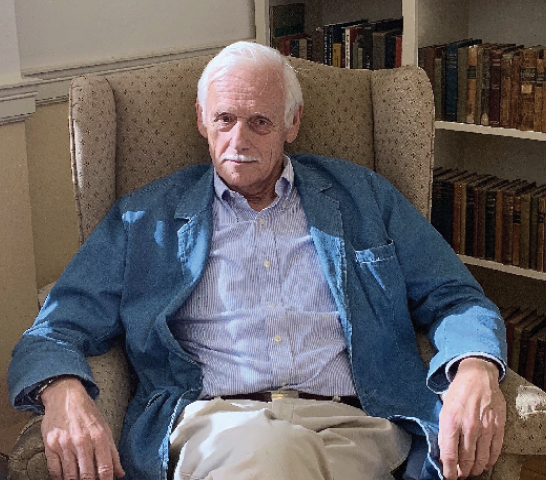Thursday, April 24
Unraveling The Expansive Career of Gus Hedberg
Sabrina Ottaway '25 (Opinions Editor, 144th Board) in Features | October 7, 2022

The 2022-2023 school year marks Gus Hedberg’s H’03 P’96 ’00 31st year at The Lawrenceville School. From his rendezvous as a faculty advisor for The Lawrence to his “humiliating” downfall as a New York City journalist in 1984, his endless stories have made him a fan favorite among Lawrentians. However, many students may not know that his long tenure at Lawrenceville was, according to him, “a work of fate.”
Hedberg originally attended Columbia University, where he received a bachelor's degree in English and a master’s degree in Magazine Journalism. After he graduated, he became a New York City journalist for several decades. He wrote for various publications under the Time Inc. umbrella, including Money Magazine, where he was eventually appointed senior editor. At the same time, Hedberg taught at Columbia’s Graduate School of Journalism and was later an adjunct professor of English at New York University, where he had the privilege to instruct seasoned and prolific writers.
Hedberg’s work was nominated for numerous journalistic awards, from The National Press Club Award for Service to the Individual to the “biggie,” The National Magazine Award. In reference to an article he wrote about a novel, yet flourishing personal computer industry, he said, “My article was prescient, prophetic, and even world-shaping.” He made sure he “shined [his] shoes for the Gala Awards Dinner at the Helmsley Palace,” a luxurious hotel in Manhattan's Midtown. However, the night ended dismally when Hedberg felt that he suffered a humbling blow. “The prize went to Outside Magazine for an article on the niceties of fileting a fish,” he recalls. Poking fun at his own loss, he said “I and the three other shortlisted nominees enjoyed crow for dinner, bones-in.”
Hedberg later found himself working as a freelance journalist; amidst the chaos of being a journalist-by-day and professor-by-night, he received a call from David Cantlay H’89 ’91 ’93 ’94 ’15 P’07 ’09 ’11, an English teacher and Editor for the School’s alumni magazine, The Lawrentian. “The Head Editor skipped town, and nobody knew where he went,” Hedberg recalled. Cantlay needed to know immediately if Hedberg wanted to take his place. Initially, Hedberg was hesitant and uninterested in “constantly interviewing people on how much they loved Lawrenceville or hated it.” However, he knew the position would provide a break from his draining job as a freelance journalist. Hoping the position would also be an entry point into a refreshing teaching opportunity at Lawrenceville, Hedberg called back and took the offer.
Luckily for him, his prayers were answered. His journalistic expertise from The Lawrentian translated perfectly to his job as a faculty advisor to The Lawrence from 1997 until 2011. Past the cloak of the operative routine of managing a weekly, campus-wide newspaper, Hedberg recalled an ebullient atmosphere inside the office, with lots of “joking, laughing, and eating.” At Lawrenceville, Hedberg would explore a newfound passion for instructing English and interdisciplinary subjects, as well as helping shape the next generation of journalists. He also affectionately reflects on his time as a II Form English teacher, especially as an instructor to students with just-burgeoning world views and interests. Hedberg reminisces that “in instructing [II Form] students, I discovered that you had more of an effect, one more powerful and potent.” Despite enjoying II Form English, one of his favorite classes he taught was a V Form elective called “Springtime With The Puritans.” Hedberg admitted the course sometimes failed to woo many rising V Formers, but it would garner students’ enthusiasm and fascination over the course of the year. He attributed the hype to how well the class revealed the fascinating extent to which “puritanism…profoundly impacted the American Character…even for those who [didn’t] observe Christianity.” Just like the many classes he taught throughout his tenure, Mr. Hedberg just can’t bear to choose a favorite book either. He still looks forward to the pleasures of dissecting The Great Gatsby in III Form English every year. Notably, he also looks forward to exploring and confronting the tensions between the lines at the Harkness table. He asserted that the “racist and mildly antisemitic story couched in a pervasive ethos of upper crust snobbism should make our skins crawl.” Oftentimes, he observes it doesn’t. The question persists every year if it’s “because the book comes with the safe imprimatur of a broad academic consensus, which, really, should mean nothing, or [because] the sheer beauty of the prose and the tenderness…that Fitzgerald brings…overwhelm its repugnant elements.” Mr. Hedberg admits he does not have an answer. Nonetheless, “I always look forward to trying to figure that out with the class.”
Gus Hedberg has seen thousands of young people evolve as people, thinkers, problem-solvers, and as Lawrentians. He succinctly phrases his advice for current Lawrentians as this: “read carefully and critically.” Though influenced by his career as a journalist, the virtue of his advice is nonetheless essential to all of the journeys and paths that intersect at Lawrenceville.
Related Articles
- A Sweet Return: Melba Reopens with New Flavors and Community Spirit Ella Song ’27
- The Clock’s Ticking: A Rush to Sort Out Scheduling Conflicts Bella Wu ’28
- Debunking the Dining Hall Debate: Is Lawrenceville’s Dining Really That Bad? Isabelle Lee ’27
- Senior Profile: Sophie Cheng ’25 Katherine Qiu ’27
- Dear Pearl: The Reveal! Pearl ... and Riley McKibben ’25
Recent Articles
- Announcing: Valedictorian, Aurelian Speakers, and Faculty Speaker Sophie Liu ’27
- Senior Profile: Sophie Cheng ’25 Katherine Qiu ’27
- Debunking the Dining Hall Debate: Is Lawrenceville’s Dining Really That Bad? Isabelle Lee ’27
- Welcoming Our New VPs for 2025-2026 Sophie Liu ’27
- A Sweet Return: Melba Reopens with New Flavors and Community Spirit Ella Song ’27